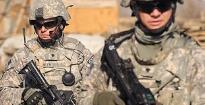Will US Change Afghan War Strategy?
 The Christian Science Monitor reports:
The Christian Science Monitor reports:
The White House assessment of the war in Afghanistan released Thursday does not stray from the Pentagon's prediction that, by year's end, there would be notable progress on the ground there. A bit surprising, however, has been the subtle movement of some senior military officials and key White House advisers away from counterinsurgency – and toward a more cost-effective, and less troop-intensive, strategy.
The assessment of the US military’s work this year, prepared by the National Security Council with considerable Pentagon input, finds “notable operational gains” since thousands of US troops were surged into the country under President Obama’s orders. “Most important, al Qaeda senior leadership in Pakistan is weaker and under more sustained pressure than at any other point since it fled Afghanistan in 2001,” reads the report.
As expected, it paints a rosier picture than does the National Intelligence Estimate, the summary of progress put forward by 16 US intelligence agencies and released to some members of Congress last week.
The White House report concludes that the current US strategy in Afghanistan “is setting the conditions to begin the responsible reduction of US forces in 2011.” The challenge, it notes, “remains to make our gains durable and sustainable.”
But behind the scenes support is growing among senior Pentagon leadership for a considerable shift in US strategy. It would be a shift based, supporters say, on harsh cost realities and a war that, in the words of the go-to think tank for the Obama administration, remains “a wicked problem” in which “all outcomes are likely to be suboptimal for the United States, its allies, and the Afghan people” despite the “yeoman efforts of the last nine years.”
Throughout that time, US soldiers have become earnest students of counterinsurgency warfare. It is the strategy and a belief, championed by Gen. David Petraeus, that the key to winning in America’s current wars is earning the trust and support of the people through good security and strong government programs. In emphasizing building up the state and protecting citizens, counterinsurgency advocates tend to deemphasize insurgent death tolls as a measure of success.
The problem, critics say, is that counterinsurgency requires a lot of soldiers. It is also expensive – no small consideration during an economic slump and a war that by next year will have cost the United States at least $250 billion.
Equally important, counterinsurgency requires a strong partner government – one that senior military officials concede is currently lacking in Afghanistan. In a report earlier this year, the White House said the Afghan government led by President Hamid Karzai was “unsatisfactory throughout the first half of 2010.”
Senior Pentagon officials and some of the top advisers to the US military’s war effort have been warning, too, that in a vast and poor country like Afghanistan in which there seems to be little support for a strong central government after nearly a decade, America’s strategy focused on building it up may be misplaced.
The shift advocated by some senior military officials would involve moving away from counterinsurgency and toward a strategy of counterterrorism – the Pentagon’s shorthand for the more conventional approach of aggressively pursuing and killing insurgents, generally with small teams of special operations forces.

